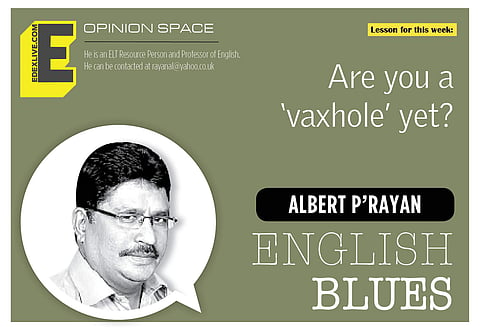

Mr A: When are you going to have your COVID-19 vaccine?
Mr B: I received my first jab of vaccination yesterday.
Mr A: Covaxin or Covishield?
Mr B: I was Covaxined. I was in a dilemma whether to be Covaxined or Covishielded. When I visited the hospital where I got my jab, I didn’t have any option.
Mr A: Is it common to use the vaccines ‘Covaxin’ and ‘Covishield’ as verbs?
Mr B: Creative people use language creatively. In social media, we can find creative expressions such as #covishielded or #covaxined. We feel the need to create a new verb when there is no existing verb to describe a particular act. We use the term ‘verbification’ or ‘verbing’ to talk about the act of converting a noun into a verb.
Mr A: Sounds interesting. Can you give me a few more examples?
Mr B: A friend of mine in Russia was Sputniked and another friend in the US was Pfizered. Whenever some nouns are used as verbs by a prominent person in the news, the media starts highlighting them and people start using them. Then the ‘verbed nouns’ become part of our lexicon.
Mr A: Can you give me some more examples of some popular nouns that are used as verbs?
Mr B: Here are examples of such nouns that are used as verbs: chair, cup, divorce, drink, dress, excuse, fool, host, mail, medal, merge, model, pepper, salt, ship, sleep, strike, style, train, voice.
Mr A: Let me use them in a sentence:
Are there enough chairs in the hall? The Principal is going to chair the meeting.
She wants to divorce her husband. She is getting her divorce papers ready.
Mr B: Good. Let me give a striking example:
Some fools think that they are wise and try to fool everyone. They can fool the eye but not the heart.
Mr A: By the way, what is the real meaning of the word ‘vaccine’?
Mr B: The word ‘vaccine’ and ‘vaccination’ come from the Latin word ‘vaccinia’ which means cowpox, a virus that attacks cows. This virus was administered into a human being in order to prevent the person from contracting the disease. Now, the meaning of the word ‘vaccine’ is stretched and is no longer associated with cows or the cowpox virus.
Mr A: Interesting. Do we use ‘for’ or ‘against’ after ‘vaccine’ and ‘vaccinate’?
Mr B: It is very common to use the preposition ‘against’ after ‘vaccine’ and ‘vaccinate’. Here’s an example:
Scientists have developed vaccines against COVID-19
The preposition ‘for’ can be used in certain contexts:
Vaccine for protection against TB
Mr A: Very useful.
Mr B: Let me conclude my chat with you with this bit of information: The Urban Dictionary’s March 14 Word of the Day is ‘vaxhole’, which is a person who has been fully vaccinated for the COVID-19 virus and brags about it. You must have seen many of them posting their selfies on their Instagram pages!
